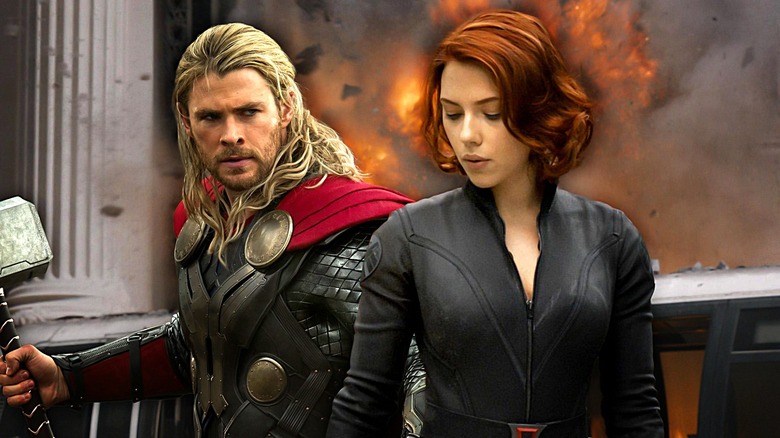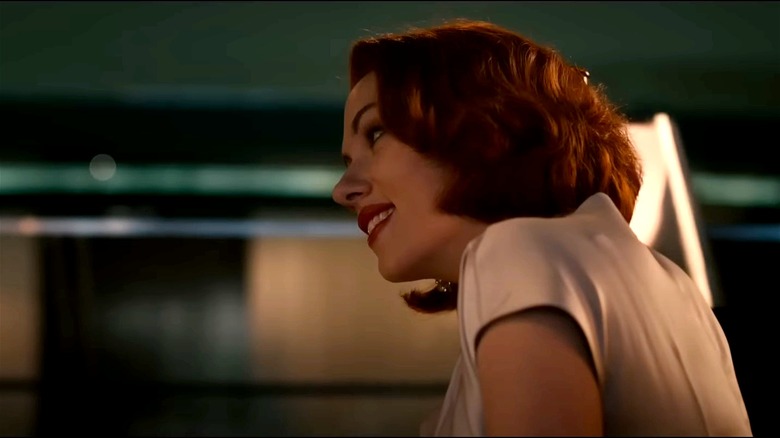Black Widow Refusing To Lift Thor's Hammer Is A Powerful MCU Moment - Here's Why
"Avengers: Age of Ultron" may focus on the MCU's finest heroes attempting to stop a James Spader-voiced AI villain, but it also provides some quality moments between Earth's Mightiest Heroes themselves. One of these takes place high up in Stark Tower as the intrepid crew takes turns attempting to lift Thor's (Chris Hemsworth's) hammer.
The scene is filled with testosterone-laced camaraderie as each male member of the group takes turns trying to raise the hammer off the table. Tony Stark (Robert Downey Jr.) and Rhodie (Don Cheadle) unsuccessfully use their armor, while Steve Rogers (Chris Evans) gets the mysteriously weighted weapon to budge but doesn't lift Mjolnir in "Avengers 2."
After everyone has had a turn, Bruce Banner (Mark Ruffalo) gestures to Natasha Romanoff (Scarlet Johansson) to give her a chance, to which Black Widow replies, "Oh, no, no. That's not a question I need answered." This makes her the only hero in the room to turn down the challenge. Judging from the character's confident demeanor, the refusal clearly doesn't come from any kind of insecurity. On the contrary, it implies that she is a self-aware individual who already knows from her checkered past that she isn't worthy of lifting Mjolnir — and that suits her just fine.
From the moment Black Widow makes her first epicurean appearance in "Iron Man 2," it's clear that she's hardly the ethically scrupulous superhero type. She leaves a wake of manhandled enemies in her wake as she fights her way through Hammer Industries Headquarters at the end of that film. From there, Romanoff embarks on a multi-film story not of ethical purity but of redemption.
Black Widow is hardly a Mjolnir-worthy hero
Unlike heroes like Steve Rogers, who flirts with worthiness and eventually achieves it, Natasha Romanoff spends her time redeeming her past crimes and unjust actions through her superhero exploits.
It's worth pointing out that she's well aware of her internal condition throughout this process and hardly needs validation. When something as petty as lifting Mjolnir is literally put on the table, she laughs it off as something she doesn't need to confirm. Likely, she already knows she's unworthy — and she doesn't care.
This display of intellectual strength and ethical awareness is powerful. Unlike everyone else in the Avengers, Romanoff doesn't need to judge herself via a magic hammer that an insecure alien prince (with plenty of blood on his own hands) is touting as a detector of worthiness. She is on her own journey — one that ultimately leads to her own pure, personal sacrifice to save half of the living creatures in the universe.
It's worth pointing out that this is a cinematic story arc, not a comic book one. She does try to lift the hammer (though in a much more desperate moment) in the comics — and sure enough, she succeeds. Of course, that sort of development would take a story like "Age of Ultron" in a very different direction. It appears Kevin Feige and Company opted instead for a casual, self-aware dismissal, saving the reveal of Romanoff's worthiness for the future and creating one of the most powerful moments in the MCU in the process.

